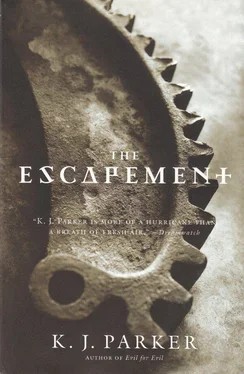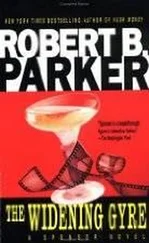K Parker - The Escapement
Здесь есть возможность читать онлайн «K Parker - The Escapement» весь текст электронной книги совершенно бесплатно (целиком полную версию без сокращений). В некоторых случаях можно слушать аудио, скачать через торрент в формате fb2 и присутствует краткое содержание. Жанр: Фэнтези, на английском языке. Описание произведения, (предисловие) а так же отзывы посетителей доступны на портале библиотеки ЛибКат.
- Название:The Escapement
- Автор:
- Жанр:
- Год:неизвестен
- ISBN:нет данных
- Рейтинг книги:4 / 5. Голосов: 1
-
Избранное:Добавить в избранное
- Отзывы:
-
Ваша оценка:
- 80
- 1
- 2
- 3
- 4
- 5
The Escapement: краткое содержание, описание и аннотация
Предлагаем к чтению аннотацию, описание, краткое содержание или предисловие (зависит от того, что написал сам автор книги «The Escapement»). Если вы не нашли необходимую информацию о книге — напишите в комментариях, мы постараемся отыскать её.
The Escapement — читать онлайн бесплатно полную книгу (весь текст) целиком
Ниже представлен текст книги, разбитый по страницам. Система сохранения места последней прочитанной страницы, позволяет с удобством читать онлайн бесплатно книгу «The Escapement», без необходимости каждый раз заново искать на чём Вы остановились. Поставьте закладку, и сможете в любой момент перейти на страницу, на которой закончили чтение.
Интервал:
Закладка:
So far, it hadn't been so bad. Mostly it had been walking, and Linniu was good at that. He'd walked from the farm to the muster at Watersmeet, where he'd met the other soldiers. It had taken him a while to get used to so many strangers, but once he'd accepted the fact that he couldn't learn all their names or ask them all about their farms and herds, he'd realised that mostly they were just his own reflections in water; sons of other farms, his own age or thereabouts, most of them wearing older boots or shirts than him. He'd insisted on dressing in his best, of course. The pleasing thing was, so had they.
The camp at Loigna had been the same, only more so. The People's Defence Force had given them tents to sleep in, and stale bread and very poor bacon to eat (just as well, since his three days' rations from home had had to last him the best part of a week), and a genuine Mezentine helmet that was too small and hurt his head, but he didn't actually have to wear it all the time, so that was all right. He'd brought his own bow, naturally, and all seventeen arrows. He was a bit concerned on that score. They'd told him he was unlikely to have a chance to find them again after the battle (indeed, there might easily be more than one battle), and the arrows they'd brought along in big birchwood barrels were no good at all, warped in the shaft, the wrong spine for his bow and fletched with feathers from some bird he'd never heard of before. He had an uneasy feeling that when he got home, a fair slice of his vast treasure of gold, silver and bronze would have to be spent getting a decent set of arrows from the fletcher at Gollinagap. He'd tried to raise the issue (tactfully) with the officer, but the man had just looked at him.
Then came basic training, which left him more bemused than ever. Most of it seemed to be learning how to stand (something he'd been doing since he was a small child, but not the right way, apparently), walk up and down in an artificial manner, and hold the spear and shield he hadn't got in the approved manner. It was comforting that none of the other farm boys understood it or managed to get it right, but he couldn't help wondering. If a battle involved standing with your feet together until a sergeant told you to stand with your feet apart, it couldn't be anything like what he'd imagined. Eventually, however, they moved on to archery, which was reassuring, since he knew all about that. Indeed, to his great surprise and lasting joy, he came third, with eight golds out of ten at seventy-five yards. For that they made him a lance corporal, an honour he'd have appreciated even more if they'd explained what it meant.
After the archery competition, they were declared fully trained. After all, the sergeant told them, they were all country lads; they were fit, they knew how to move quietly, how to shoot; they'd all been beaters on driven days, or long-netted rabbits, so they knew how to work as a team, obey the line captain's orders, be where they were supposed to be and not make a noise. As far as the sergeant was concerned (he was Eremian, in his early fifties, with a scar on his face you tried not to look at), that made them better soldiers than arrow-fodder recruited in some town. Their officer wasn't so bad, he added, as officers went. They'd be all right.
From Loigna they moved on to Sicrypha; not walking, riding in carts, which made him think of haymaking when he was a boy. By now he was something of a hero, because of his eight out of ten, and because his boots were practically new and not hand-me-downs, and because when the cart got stuck in deep ruts in a stony lane, he'd taken charge and got it out again by rolling it back just far enough to pack the ruts with withy brash-didn't everybody know that was what you did? Apparently not.
At Sicrypha, they got paid. That made him very happy. Twelvepence in coined money, not lead tokens; vast treasure already, and they hadn't so much as seen a single marauding savage. He tied the coins up securely in a bit of cheesecloth.
From Sicrypha they went to Doulichar, where they got off the carts and walked for two days until they met up with the rest of the army. That was a remarkable thing. Later, someone told him that they'd mustered over two hundred, something he found hard to believe, even though he'd seen the huge sprawl of tents with his own eyes. Two hundred people, all in one place. It was impressive, even magnificent, but it made him feel uneasy.
Doulichar (he'd heard the name often enough, never expected to go there) was a river town, built around a wharf where the Lonazep barges stopped to load. The carter who collected their malt, oats and honey came here twice a year; he'd talked about the rows of squashed-up-together houses and sheds, the strangers that not even the locals knew, the brown faces of the Mezentine buyers who came down once in a blue moon. He'd always listened to that sort of talk with a blend of wonder and scepticism, half believing it as though it was fairy-tales or his uncle's more extreme reminiscences. Actually to be there, seeing it, made him feel very strange, as if he'd wandered into a story himself, like the boy who fell asleep on the haunted bank and was kidnapped by the elf-king's daughter. It was all very wonderful, but he wasn't sure he liked it. It seemed like a terrible lot of trouble and expense to go to, if the job they were supposed to be doing was as simple and straightforward as everybody seemed to think. The impression he'd got from the sergeant had been of a slightly more dangerous version of a boar-hunt, but as he watched the other companies shooting at the butts or practising the standing-with-feet-together thing over and over again, he wasn't at all sure. Boar-hunting, after all, wasn't exactly difficult, so long as you observed a few simple rules. There had to be more to it than they were letting on.
Three days at Doulichar, very busy doing nothing; and then the barges the carter had told him about turned up early one morning, except they weren't there to load oatmeal.
"We're getting on that?" he heard someone say.
"Yes." The sergeant; an Eremian, like the one at Loigna. "What about it?"
"But I've never been on a boat before."
"So?"
Being on the barge was very strange indeed. They all had to sit in the hold-fancy name for the bottom of the boat; rather like being in a pit, because the sides of the barge were so high you couldn't see anything except other people and sky-and there wasn't a lot of room. When you needed to pee, you had to call to a man up the other end, who made his way down to you, treading on people's legs and feet, and brought you a bucket. When it was full he emptied it over the side; not a good thing if the wind was blowing. The sky was getting steadily darker all the time, and he could smell rain. He thought of wet days in the field: netting snipe on the marsh, clambering over tussocks of coarse grass and sinking past his knees in stinking black mud. Wherever they were going, he hoped it wouldn't rain there. Things always went wrong in the wet.
Two days on the boat; cheese like hard plaster, bread you could've sharpened knives on, cold sausages you wouldn't have fed to the dog back home. Which was odd; because a while back, when they'd loaded oats and cheese and bacon for the carter, he'd said something about prices being high because of having to feed the Mezentine army in Eremia, and the stuff they'd sent off had been plain but perfectly good, not like this rubbish. Maybe the army did something to the food, on purpose-God only knew why they'd want to, but everything they did was so totally inexplicable, one more mystery shouldn't make any odds.
On the third day, he woke up to find the boat wasn't moving. He started to ask the man next to him what was going on, but the sergeant hissed at him to be quiet. Talking wasn't allowed, apparently, and so they spent the whole day huddled in silence, going nowhere, nothing to see but the lead-black clouds. Just after noon it started raining. There was no cover on the boat, so they got very wet. Nobody explained why this was helping the war.
Читать дальшеИнтервал:
Закладка:
Похожие книги на «The Escapement»
Представляем Вашему вниманию похожие книги на «The Escapement» списком для выбора. Мы отобрали схожую по названию и смыслу литературу в надежде предоставить читателям больше вариантов отыскать новые, интересные, ещё непрочитанные произведения.
Обсуждение, отзывы о книге «The Escapement» и просто собственные мнения читателей. Оставьте ваши комментарии, напишите, что Вы думаете о произведении, его смысле или главных героях. Укажите что конкретно понравилось, а что нет, и почему Вы так считаете.












